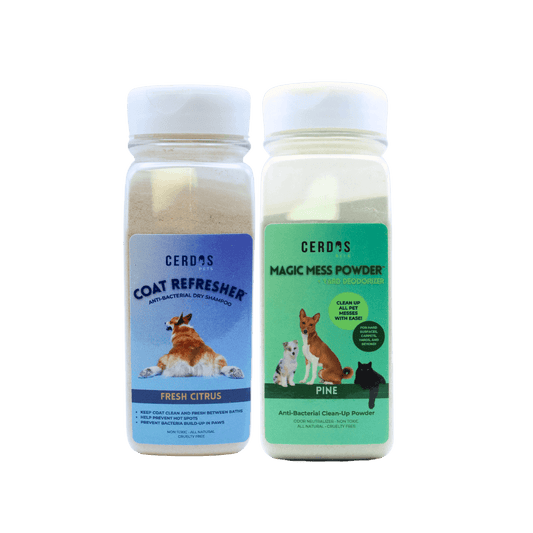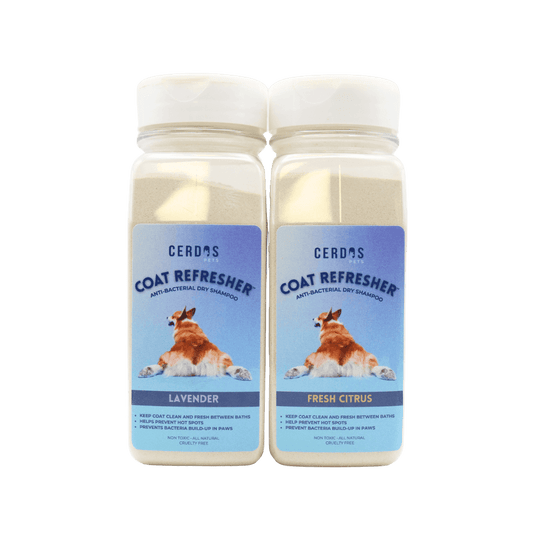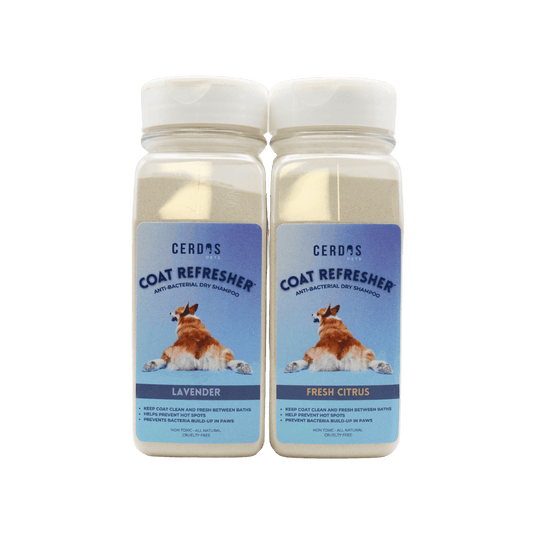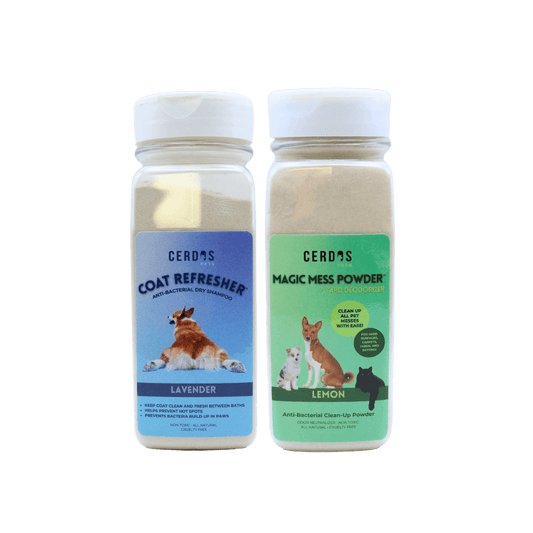What Dog Breeds Are Prone to Skin Problems & Coat Sensitivities?
Table of content
Some dogs are more than just a little itchy, they’re born with skin that needs extra love and attention. If your pup has dry patches, constant scratching, or frequent skin infections, you’re not alone. Additionally, certain dog breeds are genetically prone to skin sensitivities and coat issues. Interested in knowing which dog breeds are more prone to skin problems and coat sensitivities?
We’ll break that down for you! Below are some of the most common dog breeds that need a little extra caution when it comes to taking care of them.
Additionally, Cerdos Pet Products are free from harsh chemicals, artificial fragrances, and harmful additives— which prevent annoying hot spots.
Most Common Dog Breeds with Skin & Coat Sensitivities:
1. Frenchies & Bulldogs (English & American)

This all-natural, antibacterial dry shampoo is perfect for dogs that dislike water, have sensitive skin, or need quick freshening up. Made with mineral absorbents, plant-based ingredients, and essential oils, it gently lifts away dirt, oil, and odors— leaving behind a clean, pet-safe scent.
From tear stains and wrinkly skin folds to everyday odor control, this duo gives you two refreshing options for fuss-free grooming.\n \n \n \n \n ","contentAlignProduct":"Center","infoProduct":{"id":"gid://shopify/Product/9936424141074","title":"COAT REFRESHER™ Bundle","currencyCode":"USD","amountMax":"40.8","amountMin":"25.5","price":"25.50","compareAtPrice":null,"imagesUrl":"https://cdn.shopify.com/s/files/1/0914/9258/1650/files/Coat_Refresher_10oz_Scent_Combo_Product_Image.png?v=1748108625&width=600","urlStore":"/products/coat-refresher%E2%84%A2-bundle","altImage":"10oz Coat Refresher Scent Combo Product Image"},"colorTitle":{"hue":204.55,"saturation":0.7857,"brightness":0.549,"alpha":1},"colorPrice":{"hue":0,"saturation":1,"brightness":0},"colorDiscount":{"hue":356,"saturation":0.74,"brightness":1},"hidden":false,"locked":false,"blockName":"Text and product","componentId":"undefined"}
Coat Refresher™ Duo – Lavender & Fresh Citrus Keep your pup smelling fresh and looking clean— no bath required! The Coat Refresher™ Duo includes both our calming Lavender and zesty Fresh Citrus scents at a 15% discount, making it easier than ever to maintain a clean, happy coat between washes.
This all-natural, antibacterial dry shampoo is perfect for dogs that dislike water, have sensitive skin, or need quick freshening up. Made with mineral absorbents, plant-based ingredients, and essential oils, it gently lifts away dirt, oil, and odors— leaving behind a clean, pet-safe scent.
From tear stains and wrinkly skin folds to everyday odor control, this duo gives you two refreshing options for fuss-free grooming.
2. Boxers

Additionally, Boxers are known to suffer from seasonal flank alopecia– a condition where patches of hair on the sides may thin out in winter due to lack of sunlight.
3. German Shepherds

4. Pugs

5. Golden & Labrador Retrievers

Labradors similarly suffer frequent food or environmental allergies that cause itchy, flaky skin, hot spots, and excessive paw licking. Their thick double coats can also trap moisture and hide irritation until it becomes severe.
6. Terriers (Pit Bulls, Westies, Bull Terriers)

On the smaller side, West Highland White Terriers (Westies) are almost legendary for their high rate of atopic dermatitis; up to 25% of Westies may be affected by allergic skin disease. Additionally, Bull Terriers and Boston Terriers also show a tendency for atopic dermatitis (pollen, dust, and chemicals can set them off).
7. Shar-Peis

8. Dachshund

9. Spaniels (Cocker Spaniels & Related Breeds)

On the skin, many Spaniels suffer from atopic dermatitis. Cocker Spaniels, in particular, are prone to a form of seborrhea that makes their skin oily and flaky with a rancid odor if not managed. They may also develop "hot spots" and itchiness from flea allergies or environmental allergens, similar to retrievers.
10. Shih Tzus

Certain dog breeds are genetically prone to skin and coat problems, especially in harsh weather climates where dry air, salt, and indoor heating worsen existing conditions. Remember, there are natural remedies and resources for a dog’s irritated skin.
Love Their Skin, Naturally
If your dog belongs to one of these sensitive-skinned breeds, you know how important it is to treat their coat with extra care. Whether it's wrinkles that need regular cleaning, a coat prone to hot spots, or allergies that flare up with the seasons, your pup deserves gentle, effective solutions that actually work. That’s where Coat Refresher™ by Cerdos Pets comes in.

Get your Coat Refresher™ or Coat Refresher™ Bundle today!





